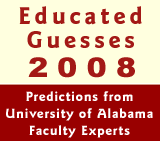 Baby Boomers are likely to flock to Asia in increasing numbers in the year ahead in search of respect that’s often gone unpaid in the United States, says a University of Alabama professor with expertise in Chinese business management.
Baby Boomers are likely to flock to Asia in increasing numbers in the year ahead in search of respect that’s often gone unpaid in the United States, says a University of Alabama professor with expertise in Chinese business management.
“China in particular has a very different view of their elderly than we,” says Dr. Daniel Bachrach, assistant professor of management at UA and a member of the International Association for Chinese Management Research. “I wouldn’t be at all surprised if there was a significant movement of retiring baby boomers heading to Asia, with a good bit of cash in their pockets, to soak up some of the respect that is missing for them here in the U.S.”
It has long been thought that the Chinese culture discourages ageist attitudes and values toward the elderly. The filial piety teachings of Confucius require one to ensure the emotional and physical well-being of the elderly, especially one’s parents.
However, Bachrach says there’s a different attitude in the United States. “We don’t have particularly good feelings about the elderly – they don’t drive like we would like them too, and they don’t hear as well as we would like, and they talk too much about what we should be doing.”
Bachrach notes that same kind attitude about our elderly citizens doesn’t exist in some of the Asian countries where the United States has developed a great deal of commercial infrastructure.
What will happen when the Baby Boomers “age-out,” Bachrach says “is of course a very important question. I have heard a lot about this group going back for second careers as their empty nests begin to fill with grandchildren, and I have also heard a lot about this group giving back, sort of taking on socially responsible activities in a volunteer capacity. This is the largest generation of the 20th century, and it has amassed a huge amount of wealth. There has been a boom in international leisure travel as this group spreads its wings a bit in other hemispheres.”
Source
Dr. Daniel Bachrach, 205/348-8947, dbachrac@cba.ua.edu